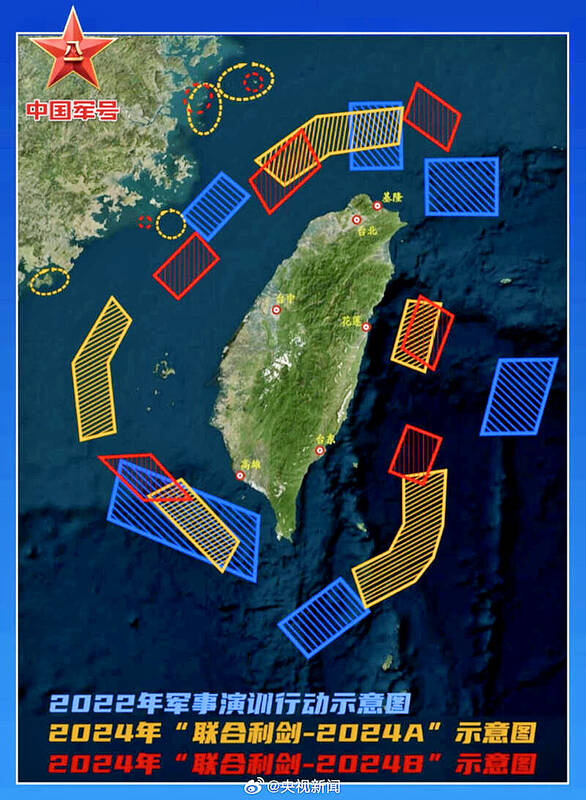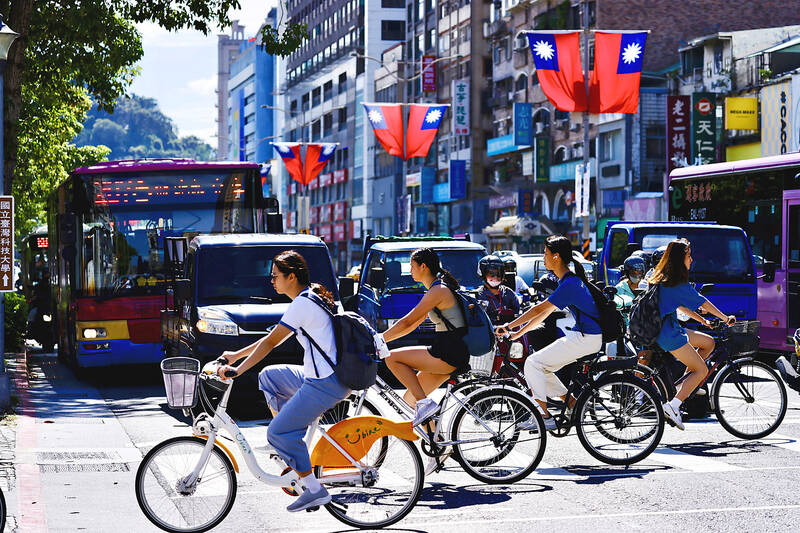Although China’s “Joint Sword-2024B” military exercises around Taiwan on Monday were apparently shorter than the previous “Joint Sword-2024A” drills, they were intense in terms of swift simulated attacks and deployment of ships and aircraft.
The previous large-scale military drills encircled Taiwan on May 23 and 24, the purpose of which was to respond to President William Lai’s (賴清德) May 20 inaugural address.
Lasting only 13 hours, Monday’s exercises came four days after Lai delivered his first Double Ten National Day address, in which he said the People’s Republic of China has “no right to represent Taiwan” and reiterated that the two sides of the Taiwan Strait were “not subordinate” to each other.

Photo: Screen grab from the Chinese People’s Liberation Army Eastern Theater Command’s Sina Weibo account
The Chinese People’s Liberation Army (PLA) said that part of the drills practiced what it called a “key port blockade”, severing Taiwan’s maritime lifeline for imports of trade, food and energy.
It aimed to show China’s ability to stop energy imports, especially at ports offloading liquefied natural gas (LNG), PLA National Defense University professor Zhang Chi (張弛) told China’s Global Times.
“The People’s Liberation Army wants to prove that we have the ability to block the import of energy resources for Taiwan, thereby having an important impact on the economy and society,” the newspaper quoted Zhang as saying.

Photo: Ritchie B. Tongo, EPA-EFE
Foreign military attaches and analysts said this element of the drills is being closely scrutinized, as such a tactic could pressure and isolate Taiwan ahead of any full-blown invasion.
State-run energy company CPC Corp, Taiwan said LNG imports had been unaffected by the drills, decrying as false news online suggestions to the contrary.
“This time there was a rather special component, the so-called quarantine or blockade, during which they practiced their blockading abilities,” said Su Tzu-yun (蘇紫雲), director of defense strategy and resources at the government-funded Institute for National Defense and Security Research.
The drill zones portrayed in a map issued by the PLA were closer to Taiwan than in previous exercises, with all, for the first time, including areas within Taiwan’s 24 nautical mile (44.4km) contiguous zone.
“All the drill zones they announced are more closely approaching Taiwan proper, and all include the 24 nautical mile zone,” said Ma Chen-kun (馬振坤), director of the Graduate Institute of China Military Affairs Studies at National Defense University.
The China Coast Guard, now the world’s largest by far, was more heavily involved in the drills than earlier, encircling the Taiwan-controlled Matsu islands near the Chinese coast and operating on both sides of Taiwan proper.
Taiwan is particularly wary of China Coast Guard efforts to board civilian ships on law enforcement grounds.
Such instances could be a serious provocation that the Coast Guard Administration (CGA) would do everything to prevent, CGA Deputy Director-General Hsieh Ching-Chin (謝慶欽) said on Monday.
Previous Chinese war games have been accompanied by the release of military videos of animations of missile attacks on Taiwan.
This time, one caricatured Lai with devil-like pointed ears, in what one security source in Taiwan called an unusually personal attack on a man Beijing already detests as a “separatist.”
China also released two less slickly made videos of navy sailors commenting on weather conditions and their locations, close to the ports of Keelung and Kaohsiung.
In Taiwan, television stations show such videos as part of regular drill coverage. The government calls them part of “cognitive warfare” waged to sap confidence in its military.
Shortly after Monday’s drills began, the CGA said it detained a Chinese citizen using a rubber boat to approach Menghu Islet (猛虎嶼) near Kinmen County and opposite Xiamen, China.
The CGA said it could not rule out the incident as one of China’s “gray zone” activities threatening outlying islands during the drills.
Additional reporting by staff writer

A preclearance service to facilitate entry for people traveling to select airports in Japan would be available from Thursday next week to Feb. 25 at Taiwan Taoyuan International Airport, Taoyuan International Airport Corp (TIAC) said on Tuesday. The service was first made available to Taiwanese travelers throughout the winter vacation of 2024 and during the Lunar New Year holiday. In addition to flights to the Japanese cities of Hakodate, Asahikawa, Akita, Sendai, Niigata, Okayama, Takamatsu, Kumamoto and Kagoshima, the service would be available to travelers to Kobe and Oita. The service can be accessed by passengers of 15 flight routes operated by

Chinese spouse and influencer Guan Guan’s (關關) residency permit has been revoked for repeatedly posting pro-China videos that threaten national security, the National Immigration Agency confirmed today. Guan Guan has said many controversial statements in her videos posted to Douyin (抖音), including “the red flag will soon be painted all over Taiwan” and “Taiwan is an inseparable part of China,” and expressing hope for expedited reunification. The agency last year received multiple reports alleging that Guan Guan had advocated for armed reunification. After verifying the reports, the agency last month issued a notice requiring her to appear and explain her actions. Guan

GIVE AND TAKE: Blood demand continues to rise each year, while fewer young donors are available due to the nation’s falling birthrate, a doctor said Blood donors can redeem points earned from donations to obtain limited edition Formosan black bear travel mugs, the Kaohsiung Blood Center said yesterday, as it announced a goal of stocking 20,000 units of blood prior to the Lunar New Year. The last month of the lunar year is National Blood Donation Month, when local centers seek to stockpile blood for use during the Lunar New Year holiday. The blood demand in southern Taiwan — including Tainan and Kaohsiung, as well as Chiayi, Pingtung, Penghu and Taitung counties — is about 2,000 units per day, the center said. The donation campaign aims to boost

The Central Weather Administration (CWA) said a magnitude 4.9 earthquake that struck off the coast of eastern Taiwan yesterday was an independent event and part of a stress-adjustment process. The earthquake occurred at 4:47pm, with its epicenter at sea about 45.4km south of Yilan County Hall at a depth of 5.9km, the CWA said. The quake's intensity, which gauges the actual effects of a temblor, was highest in several townships in Yilan and neighboring Hualien County, where it measured 4 on Taiwan's seven-tier intensity scale, the CWA said. Lin Po-yu (林柏佑), a division chief at the CWA's Seismological Center, told a news conference